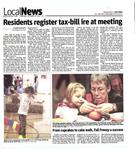They won’t be voting on their proposed $46.3 million 2011 tax levy until Dec. 12, but Wilmette School District 39 board members got a generally polite earful Monday night about taxes they got from the 2010 levy.
The complaints came from homeowners who said they had been misled about how much last spring’s successful tax rate hike referendum might increase their property tax bills; the first referendum-affected tax bills are now out.
The residents, including long-time referendum opponent Herb Sorock, told the board during its regular October meeting that they and others, including district residents who voted in favor of the rate hike last April, had been caught off guard by district-generated increases of as much as 80 percent higher than they’d expected.
“Wake up and smell the coffee,” Pontiac Road resident Katherine White said. “We’ve been duped.”
Audience members did not appear swayed by Superintendent Raymond Lechner’s pointed reminder that the district had levied no more than it promised it would during the referendum campaign.
“We levied exactly the dollar amount that was advertised,” he said, before going on to point out that estimates of referendum-based tax increases were just that — estimates. Individual tax bills can be affected by each property’s individual property valuation, and by how much the district’s total property valuation rose or dropped.
Since assessed property values dropped in the recent triennial property reassessment of New Trier Township, in which District 39 lies, the amount of taxes levied had to be redistributed. If an individual’s property actually increased in assessed value, or even decreased less than the median 11.5 percent township drop, his or her individual tax bill most likely would increase more than the estimated average, Lechner said.
Final tax bills also can change depending on if property owners lose some or all of their homeowner’s exemptions, and some property owners reported significant exemption losses, he added.
The issue wasn’t that the district levied more than it promised it would during the campaign, Sorock said, saying “I acknowledge and concede that the board did levy what it said it would” after the referendum passed, raising the 2010 general corporate levy from slightly over $39 million to roughly $43.9 million,
(The total 2010 levy, including the amount to repay debts, thus increased to about $45.2 million following the referendum.)
“But that’s not the issue. The issue is misleading expectations.”
Sorock and several of the five other speakers insisted that pro-referendum campaign literature circulated before the April 5 vote emphasized the referendum-generated tax hike of about $58.80 for every $1,000 of property valuation, not the total amount of increase taxpayers would see on their bills, which would include the amount the district could levy without voter approval, an amount of roughly $12 per $1,000.
That was not the case, Lechner said: “As discussed before the board, we expected the average taxpayer’s increase to be $70 per $1,000 … $58 of that was the voter approved amount and $12 was the amount that does not require voter approval.”
All of the information was available to residents, he said; it had been discussed fully at the board’s January, 2011 meeting and was available online.
Iroquois Road resident Stephen Hutchinson later said, “With all due respect, Dr. Lechner, I feel that we’re playing with semantics. The information that was the most widely circulated, by a landslide, was the $58.80.”
Sorock also complained that the pro-referendum campaign material failed to mention the current consumer price index that affects the ultimate amount of money the district can collect in taxes, and which now stands at 2 7 percent. He insisted district administrators knew prior to the vote, but instead emphasized the previous CPI number in their fact sheets, one which was .1 percent.
White said she had expected her tax bill to increase less than $700 because of the referendum increase, White said. Instead, the district portion of her tax bill jumped about $2,000.
“My taxes for District 39 went up 50 percent, and I wouldn’t be disappointed if everyone on the board handed in their resignations,” Vista Drive resident Louis Cahn said.



